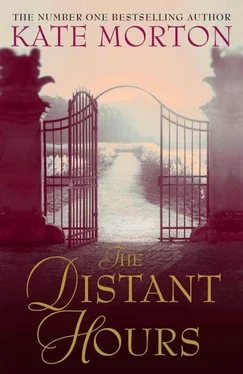‘It would be best.’
‘Of course. There’s nothing so sad as a table set for a dinner party that never was – oh my!’ She was by the door now, looking down on the mess there. ‘What’s happened here?’
‘I was careless.’
‘Why…’ Saffy went closer. ‘That looks like jam, a whole jar. Oh, what a shame!’
Percy had found it by the front door when she was returning with the shovel. The worst of the storm had passed by then, clouds had begun to blow themselves apart, and a few eager stars had broken sharply through the sheet of night. She’d seen his duffel bag first, then the glass jar beside it.
‘If you’re hungry, Perce, I could fetch you some rabbit?’ Saffy was bent over cleaning up the shards of glass.
‘I’m not hungry.’
She’d come inside and sat at the kitchen table, put the jam and the bag on top and stared at them. An age had passed before the message had made it from brain to hand, telling her to open the bag and see to whom it belonged. She’d known, of course, that it had to be him she’d buried, but it was as well to be sure. Fingers trembling, heart thumping like a wet dog’s tail, she’d reached for it, knocking the jam jar to the floor. A waste, such a waste.
There hadn’t been much inside the bag. A change of underclothes, a wallet with very little money and no address, a leather notebook. It was inside that notebook that she’d found the letters. One from Juniper, which she could never bring herself to open, another from a fellow called Theo, a brother, she’d gathered as she read.
For she did read that one. She let herself sink inside the ghastly fact of reading a dead man’s letter, of learning more than she ever wanted to about his family – the mother who was a widow, the sisters and their babies, the brother who was simple and loved especially. She forced herself to read every word twice; a half-formed notion that in such a way, by punishing herself thus, she might somehow make amends. A stupid notion. There would be no atoning now for what had happened. Except, perhaps, by way of honesty.
But was there any way she could write and tell them the truth? Any chance that they might be made to understand how it had happened; that it was an accident, a terrible accident, and not Saffy’s fault at all? That Saffy, poor Saffy, was the person on earth least capable of desiring or doing harm to someone else. That she’d been blighted, too; that despite her fantasies of London, the elaborate dreams of leaving the castle (she thought Percy didn’t know), she’d been unable ever to breach the boundaries of Milderhurst, not since that first attack of hysteria in the theatre; that if anyone were to blame for the young man’s death, it was their father, Raymond Blythe-
No. No one else could be expected to look at things that way. They couldn’t know what it was to grow up in the shadows of that book. Percy felt great bitterness as she thought about the ghastly legacy of the Mud Man . This – what had happened tonight, the damage poor Saffy had unwittingly caused – this was the legacy of what he’d done. He used to read Milton to them when they were small – Evil on itself shall back recoil – and Milton had been right, for they were paying still for Daddy’s evil act.
No. There would be no honesty. She would write something else to the family, to this address she’d found in the bag, Henshaw Street, London. The bag itself she would destroy; if not destroy, then hide. The muniment room, perhaps, would be the best place for it – what a sentimental fool she was: to bury a man but be unable to throw away his personal items – the truth, and her defiance of it, would be Percy’s burden to carry. Whatever else Daddy had done, he was right in one thing: it was her responsibility to look after the others. And she would make sure they all three stuck together.
‘Are you coming upstairs soon, Perce?’ Saffy had cleaned up the jam and was standing with a jug of water in her hands.
‘Just a few more things to take care of down here. The torch needs batteries…’
‘I’ll take this up to Juniper then. The poor love’s thirsty. See you soon?’
‘I’ll look in on my way up.’
‘Don’t be too long, Perce.’
‘I won’t. I’ll be with you soon.’
Saffy hesitated at the bottom of the stairs, turned back to Percy and smiled softly, a little nervously. ‘The three of us together,’ she said. ‘That’s something, isn’t it, Perce? The three of us back together again?’
Thereafter, Saffy stayed all night on the chair in Juniper’s room. Her neck grew stiff and she was cold despite the blanket draped across her knees. She didn’t leave, though; she wasn’t tempted by her own warm bed downstairs, not when she was needed here. Saffy sometimes thought that the happiest moments of her life had been when she was tending Juniper. She’d have liked children of her own. She’d have liked that very much indeed.
Juniper stirred and Saffy stood up immediately, stroked her little sister’s damp forehead and wondered at the mists and demons that were swarming there.
The blood on her shirt.
Now that was a worry, but Saffy refused to think too much upon it. Not now. Percy would make it right. Thank God for Percy. Percy the fixer, who always knew just what to do.
Juniper had settled again, she was breathing deeply, and Saffy sat down. Her legs ached with the day’s tension and she felt unusually tired. Still, she didn’t want to sleep: it had been a night of odd imaginings. She should never have taken that pill of Daddy’s; she’d had the most ghastly dream when she dozed off in the parlour. She’d been having the very same one since she was small, but it had been so vivid this time. It was the pill, of course, and the whisky, the upset of the evening, the storm outside. She’d been a girl again, alone in the attic. Something had woken her, in the dream, a noise by the window, and she’d gone to take a look. The man clinging to the stones outside had been as black as sealing wax, like someone charred by fire. A flash of lightning and Saffy had seen his face. The graceful, dashing youth beneath the Mud Man’s wicked mask. A look of surprise, a smile beginning on his lips. It was just as she had dreamed when she was young, just as Daddy had written. The Mud Man’s gift was his face. She’d lifted something, she couldn’t remember what, and she’d brought it down hard upon his head. His eyes had widened with surprise and then he’d fallen. Slid against the stone and down, finally down, into the moat where he belonged.
Elsewhere that night, in a neighbouring village, a woman held her hours-old baby close, running her thumb against the tiny child’s peachy cheek. Her husband would arrive home many hours later, tired from his night-watch duties, and the woman, still dazed from the unexpected and traumatic birth, would recount the details over tea, the way she’d gone into labour on the bus, the pain, the sudden, plunging pain, the bleeding and the savage fear that her baby would die, that she would die, that she would never hold her newborn son; and then she’d smile wearily, devotedly, and pause to press the tears that warmed her face, and she’d tell him about the angel who’d appeared beside her on the roadside, knelt at her knees and saved her baby’s life.
And it would become a family story, retold, passed down, resurrected on rainy nights by the fire, invoked as a means to quell disputes, recited at family events. And time would gallop on, month by year by decade, until on that baby’s fiftieth birthday his widowed mother would watch from her cushioned chair at the end of the restaurant table, as his children made a toast, reciting the family story of the angel who’d saved their father’s life, and without whom none of them would exist.
Читать дальше












